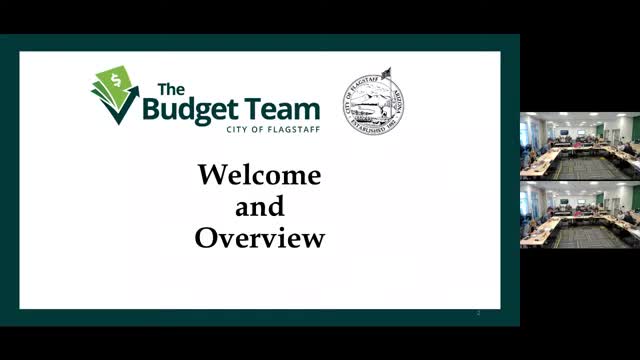Flagstaff council reviews fund health, flags long-term pressures on personnel, infrastructure and programs
Get AI-powered insights, summaries, and transcripts
Subscribe
Summary
At an April 25 budget retreat, city staff briefed the Flagstaff City Council on the health of major funds, highlighting a healthy general fund balance but growing personnel costs, construction-price escalation, gas-tax revenue risks and needs in wildfire protection, libraries, parking and solid-waste services.
FLAGSTAFF, Ariz. — At a budget retreat on April 25, Flagstaff City staff briefed the City Council on the health of the city’s major funds and on longer-term fiscal pressures affecting personnel costs, infrastructure maintenance and program delivery.
City Manager Greg opened the session by urging a multi-year view of budget planning, saying, “The budget process is...not a static process. It’s not a point in time process,” and that the city must look back and forward to prepare for future needs.
City staff member Rick Tatter provided a fund-by-fund rundown. He said the general fund remains healthy, with a fund balance around the city’s policy target of about 20 percent, and noted that personnel costs represent roughly 70 percent of the general fund budget. Tatter told the council the city has kept primary property taxes steady and retains capacity in that revenue source, but he warned that accelerating wage growth and ongoing personnel investments could constrain other operating priorities. “We need to keep investing in that to make sure we have the best people,” he said.
Tatter outlined a set of watch areas across funds. For the highway user revenue fund (the state gas-tax fund), staff noted recent operational efficiencies — including improved snow-removal performance — and a healthy fund balance at policy targets. At the same time, they cautioned that the fund’s revenue base is sensitive to gasoline consumption, which can drop when prices rise and as electric-vehicle adoption grows. He said staffing for some technical positions has been difficult to fill and that expanding multimodal and right-of-way vegetation increases recurring maintenance costs.
Transportation funds overall are meeting bond projections and attracting federal grant opportunities, Tatter said, but construction costs and property-acquisition prices have escalated faster than anticipated, creating additional pressure on project budgets.
The water resource infrastructure protection fund, which staff described as covering proactive wildland-fire management to protect water utilities, has seen investment in staff and operations but remains pressured by rising operational costs that are outpacing revenue growth; staff said they are pursuing grant matches to reduce revenue impacts.
Tatter described the library fund as having benefited from cooperative conversations with the county over property-tax distributions; the fund has supported major infrastructure work, including roof replacements and plans for window and front-entrance improvements. He cautioned that county tax growth does not always keep pace with market adjustments, which can limit future operating and capital spending for library services.
On tourism-related revenues, staff reported that the BBB tax renewal is beginning to fund projects in arts and recreation, but that hotel-revenue growth has slowed and will be monitored. Parking-district revenues are recovering as downtown parking reopens; staff said the “parking lockbox” is growing, but the capital cost of providing parking — and temporary reductions in available spaces during downtown redevelopment and Mountain Line facility construction — are concerns.
Enterprise funds discussed included solid waste and the sustainability/environmental management fund. Staff said the solid-waste team has worked to maintain recycling services while containing costs, but recycling and equipment costs (for trucks and infrastructure) remain high and have required some service adjustments. The sustainability fund is supporting investments in weatherization, efficient lighting, solar and carbon-capture pilots; staff flagged the city’s carbon-neutrality planning as an item that will require additional funding and noted limits imposed by state legislative restrictions.
Tatter closed by reiterating that the retreat is intended to identify those longer-term pressures and to solicit council direction on priorities, revenue tools and planning items to address in the coming fiscal cycle.
The session included staff housekeeping and an explanation of public-comment logistics for the retreat; no formal council votes or motions on these budget topics were recorded in the transcript excerpt provided.
